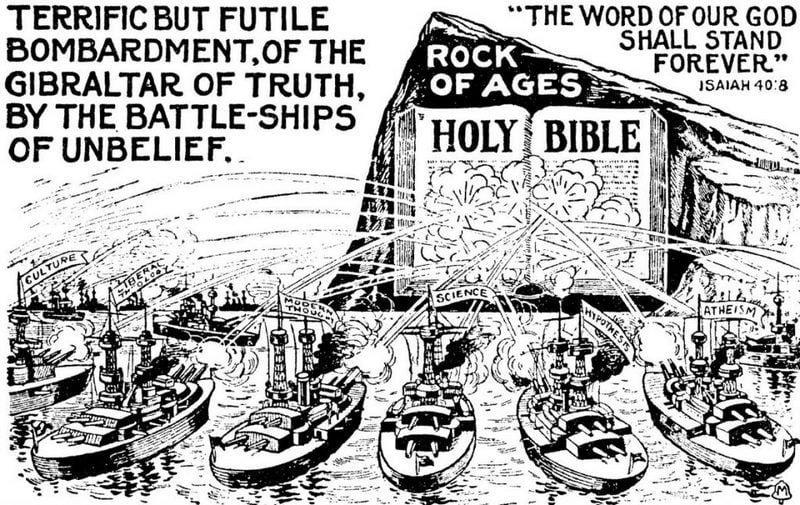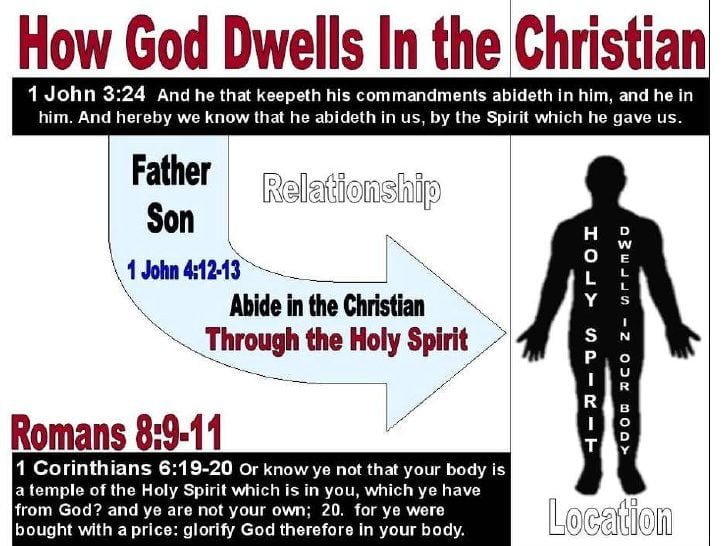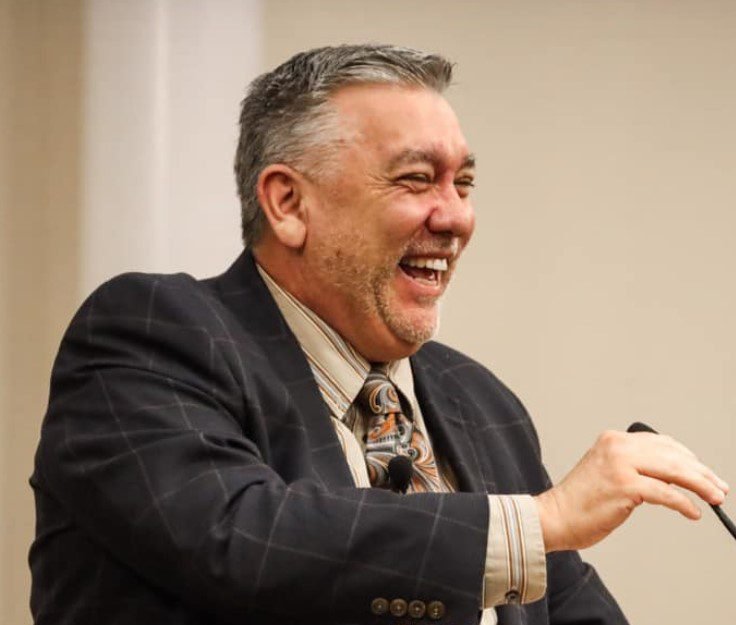
Yesterday, I responded to a long comment from an Independent Fundamentalist Baptist Christian named Gary Richards. (I have since learned that his real name is Gary MacKay.) You can read my response to MacKay here.
As is my custom, I sent MacKay an email with a link to my post. MacKay responded to my article today with what follows. My response is indented and italicized. All spelling and grammar in the original
It was a nice try Bruce, we both know that anyone can defend any which way side they want to but there is only one truth.
Much like Dr. David Tee, MacKay thinks there is one truth — his. This is a common trait among IFB adherents. Believers are encouraged to be certain in their beliefs, even though they lack sufficient education and knowledge about a given subject. They know what they know, but they don’t know what they don’t know. Certainty breeds arrogance. I’m right, you’re wrong, end of discussion, the thinking goes. That’s why it is almost impossible to have a profitable discussion with an IFB Christian. MacKay didn’t come to this site to engage is thoughtful discussion. He was here to preach and condemn.
MacKay’s behavior doesn’t surprise me. Scores of like-minded people have come before him. MacKay is deeply immersed in IFB culture. He thinks it is normal to preach AT people who disagree with you, uttering threats of judgment and eternal damnation. At some level, I feel sorry for the MacKays of the world. I was once just like them. I understand firsthand the cost of needing to be right all the time. It is a wearying way to live.
Sure, yeah, at age 15 you started, went to IFB schools, started churches & preached for all those years yet this goes on with so many and as you know Christ will say on that day “I never knew you”.
MacKay continues to delegitimize my story, suggesting that I was a fraud, just like so many other preachers today. He reminds me that one day I will stand before Christ and be cast into utter darkness.
He is alluding to Matthew 7:21-23:
Not every one that saith unto me, Lord, Lord, shall enter into the kingdom of heaven; but he that doeth the will of my Father which is in heaven. Many will say to me in that day, Lord, Lord, have we not prophesied in thy name? and in thy name have cast out devils? and in thy name done many wonderful works? And then will I profess unto them, I never knew you: depart from me, ye that work iniquity.
As a proponent of IFB soteriology, MacKay believes that a person is saved by assenting to a set of theological propositions; that once a person is saved, good works play no part in the believer’s continuing salvation. Of course, I was saved in the IFB way. The difference, of course, is that I actually believed good works matter. I actually believed that faith without works is dead; that Christians will be judged one day, not on their mental assent to Bible facts, but by their works. Jesus made this clear in Matthew 25, and James made it clear that believers show their faith by their good works.
MacKay’s bankrupt gospel is why IFB churches are filled with people who think they have no obligation to love their neighbors as themselves; that nothing they say or do will keep them out of Heaven. Such people, if there really is a God, as portrayed in the Bible, are in for a rude awakening someday. My reading of the Protestant Christian Bible suggests that God really does care about how believers live; that good works matter.
In your case you just plain walked away and are essentially an anti-christ. If you really had fruit of your salvation & the Holy Spirit put His seal on you we both know you wouldn’t be where you are today. They must have left out the part that works can’t save you while you attended your education.
MacKay didn’t read any of my autobiographical writing, so he really doesn’t know or understand my story. Had he bothered to read my story, he would have learned that I didn’t one day, out of the blue, walk away from Christianity. I spent several years agonizing over my beliefs, worried that I was losing my faith. I desperately want to remain a Christian. After all, I had been part of the Evangelical church for fifty years. I pastored churches in three states for twenty-five years. My whole life and that of my family revolved around loving, following, and serving Jesus. I was all in, as were Polly and our children (not that they knew anything different). Walking away from all that I ever knew was hardly inconsequential. I shed many a tear over what was lost, much like someone who went through an acrimonious divorce.
According to MacKay, I am an anti-Christ. His goal is to demean and slander. He returns to his claim that I never was saved, and then adds that I never understood the Christian gospel. MacKay knows better — where can I take the gospel test? — but he’s not interested in interacting with me fairly and honestly. All that matters to him is discrediting me, painting me as an anti-Christ, false prophet, and tool of Satan. All MacKay has done is reveal to fair-minded people that he is a “tool.”
I have a hard time believing that you actually get death threats or any threats at all by Christians, possibly by those that were in your same situation where you were pushed into a Christian lifestyle & never given a choice to truly choose. There are many such as yourself that got hold of the wrong spirit as you yourself demonstrate & profess. This has always been even though as we ramp up to that day there is more & more as we have been told. It isn’t a surprise. I would like to think there is hope for your surrender to Christ even though your work is Satanic & has led many astray, but even though, Paul was forgiven & became the apostle to the gentiles.
MacKay concludes his screed by calling me a liar; that my claims of death threats or any threats at all are lies, lies, lies, and more lies. Long-time readers know firsthand the threats I have received over the years. One IFB believer threatened to slit my throat; another threatened to assault my daughter with Down syndrome; and still others have said they are praying for my sudden, painful death. Then there are the repeated, often daily, threats of Hell and eternal torture, with loving Christians hoping I drop dead today. I have even received threats from IFB preachers. These experiences are, sadly, not rare. They are a reminder of the rotten, violent underbelly of Evangelical Christianity, and, in particular, the IFB church movement.
That MacKay thinks I am lying? I simply don’t care. I know what I know. I hope he never has to experience what I have experienced at the hands of so-called followers of the Prince of Peace.
MacKay concludes with an orgastic fervor, saying I got ahold of the wrong spirit; that I am Satanic. You know what is interesting? MacKay made no attempt to evangelize me. He made no attempt to lead to the right path. He made no effort to share the gospel with me. Why is that?
Gary is right about two things. First, I have led many people astray. By telling my story and helping people who have questions and doubts about Christianity, I have helped people see that there is a better day. I don’t evangelize people. My objective has never been to win souls to Loki. If anything, my goal has been to show people that there are better expressions of the Christian faith than the IFB cult. Do I want the IFB church movement to die off? Absolutely. So many good people have been psychologically harmed, and, at times, physically harmed, by IFB beliefs and practices. There are kinder, gentler expressions of Christian faith for people who truly want a faith that practices the two great commandments: loving God and loving your fellow man.
Do some people who come in contact with me lose their faith? Sure, but I never push people to deconvert. All I am is a storyteller; a facilitator. I simply don’t care all that much about what people believe as long as those beliefs don’t cause harm to them or their families. MacKay’s beliefs materially harm people, so I make no apology for opposing, with what little strength I have left, the IFB church movement.
Second, MacKay claims I got ahold of the wrong spirit. On this account, he is absolutely right. The spirit of whiskey, that is. 🙂
Well, enough.
Saved by Reason,

Bruce Gerencser, 68, lives in rural Northwest Ohio with his wife of 47 years. He and his wife have six grown children and sixteen grandchildren. Bruce pastored Evangelical churches for twenty-five years in Ohio, Texas, and Michigan. Bruce left the ministry in 2005, and in 2008 he left Christianity. Bruce is now a humanist and an atheist.
Your comments are welcome and appreciated. All first-time comments are moderated. Please read the commenting rules before commenting.
You can email Bruce via the Contact Form.







